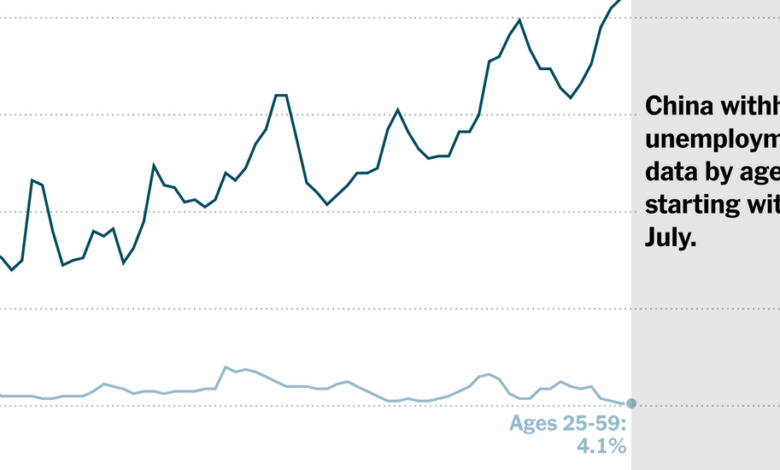China Suspends Youth Unemployment Report

The Chinese government, facing an expected seventh consecutive monthly increase in youth unemployment, said Tuesday that it had instead suspended release of the information.
The unemployment rate among 16- to 24-year-olds in urban areas hit 21.3 percent, a record, in June and has risen every month this year. It was widely forecast by economists to have climbed further last month.
The decision to scrub a widely-watched report could exacerbate the concerns expressed by investors and executives who say ever tightening government control of information is making it harder to do business in China.
Fu Linghui, a spokesman of the National Bureau of Statistics, said at a news briefing that the government would stop making public employment information “for youth and other age groups.” He said the surveys that government researchers use to collect the data “need to be further improved and optimized.”
China’s youth unemployment rate has doubled in the last four years, a period of economic volatility induced by the “zero Covid” measures imposed by Beijing that left companies wary of hiring, interrupted education for many students, and made it hard to get the internships that had often led to job offers.
The unabating struggle for young people to find work is another sign of concern about the Chinese economy, the world’s second-largest. It is flagging seven months after the government abruptly ended the “zero Covid” push, plagued by falling exports and souring consumer confidence, as well as a dangerous condition known as deflation or chronically lower prices.
China did issue several other economic reports as scheduled on Tuesday. Many were gloomy: July retail sales and growth in industrial production — a measure of the output of China’s factories, mines and power plants — fell short of expectations. Investments in real estate developments fell 8.5 percent in the first seven months of the year.
Earlier Tuesday, China’s central bank made a series of moves that pushed key interest rates to new lows. The central bank, the People’s Bank of China, is expected to lower its benchmark lending rate, which determines the interest rates for mortgages and corporate loans, next week. The aim is to juice the economy by spurring banks to lend more.
The data on youth unemployment is not the first economic report suspended this year by the Chinese authorities. This spring, the National Bureau of Statistics halted the public release of monthly readings of consumer confidence, a series that it launched 33 years ago.
Previous surveys showed that consumer confidence plummeted during a two-month lockdown in Shanghai, China’s most populous city, in 2022. Confidence barely began to recover in the early months of this year, even after Beijing lifted lockdowns nationwide in early December.
China’s policymakers have introduced measures to try to lift confidence and boost youth employment, such as offering subsidies to encourage private-sector companies and state-owned enterprises to hire more, and pressuring colleges and universities to do more to help graduates get jobs.
But the economy has been slow to respond. Private companies in China, which contribute 80 percent of the country’s urban employment, were hit especially hard by the lockdowns and mass testing that marked “zero Covid.”
On top of the damage inflicted on the job market during the pandemic, the government cracked down on the country’s technology, real estate and education industries, where educated young Chinese had flocked for jobs. The regulatory actions caused hundreds of thousands of layoffs and left companies and investors more cautious about expanding their businesses. When businesses are wary, hiring typically suffers.
Alibaba, one of China’s biggest technology companies, was a target of government scrutiny in 2020. Last year, it reduced its ranks by more than 10,000 employees, according to a report by the Chinese Academy of Social Sciences. Country Garden, one of China’s biggest listed property developers, cut more than 30,000 employees in 2022, according to a think tank established by Beijing Business Today, a state-run media company.
Young people in China are facing a big gap between labor demand and supply. According to official data, 11.6 million students were expected to graduate college or university this year — the most ever and nearly 1 million more than last year. Future classes are expected to be even larger, while economic growth had started to slow even before the pandemic.
Another challenge is the mismatch between the jobs that college graduates want and the jobs that are available. Industries like construction and transportation, which usually draw more interest from migrant workers without degrees, have picked up. But sectors like technology and education have been slower to bounce back.
Even becoming an entry-level civil servant working for the government is harder these days. Last year, a record 2.6 million people applied to take the national civil service exam to compete for only 37,100 entry-level positions.
Xi Jinping, the country’s top leader, has called for young people to go to remote areas to find work — to “eat bitterness,” a Chinese expression that refers to enduring hardship.
But China’s educated young people today want jobs with good working environments in fields such as the internet, education, culture and entertainment. Those jobs, for the most part, are not located in the countryside.
“College students do hope to go to big cities,” said Nie Riming, a researcher at the Shanghai Institute of Finance and Law, a research organization.
Rising youth unemployment could lead to broader problems, according to a June report from the China Macroeconomy Forum, a think tank at Renmin University of China.
“If it is not handled properly, it will cause other social problems beyond the economy, and it could even ignite the fuse of political problems,” the report said.
Daisuke Wakabayashi and Keith Bradsher contributed to this report.




